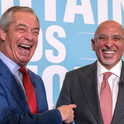Last week there were other things to worry about, of course, but while the world reeled from the horror of the terrorist attacks in Mumbai, there were a couple of quiet developments in Europe that could have far-reaching implications for the continent's foreign policy.
First, the Chinese cancelled this year's EU-China summit, due to be held in Lyon yesterday, in response to Nicolas Sarkozy's decision to meet the Dalai Lama in Poland on 6th December. While this may sound like an inconsequential diplomatic bunfight, one needs to go back several decades to the Sino-Soviet split to find a precedent for China making such a move; it usually restricts the diplomatic nuclear option to meetings involving junior officials. The annual EU-China summit, the main forum for high-level strategic discussion between Europe and China, has grown in importance over recent years, and this year the financial crisis gave a particular urgency to the talks.
Of course, had the rotating presidency of the EU been held by a country with a less volatile, more predictable head of state than Nicolas Sarkozy, the summit would probably have proceeded as normal. (France-China relations have deteriorated all year, reaching a new low in the run-up to the Olympics, when, following the debacle of the torch relay in Paris, the Chinese government ordered travel agencies not to sell tours to France and facilitated a boycott of Chinese branches of the French supermarket chain Carrefour.) Yet the fact that China feels able to treat the EU like this tells us something about the asymmetry of the EU-China relationship.
China has little to lose with Europe—it knows full well that its cancellation of the summit is not going to lead to any EU state withdrawing investment from Europe or erecting protectionist barriers to Chinese imports. China's action exposes the EU's lack of leverage in the relationship. And at a time when American intelligence analysts are warning that democratic deficits and demographic time-bombs may turn Europe into a "hobbled giant" by 2025, the EU might need to start reassessing its relationship with the country that on some estimates will be the world's largest by 2035.
Yet the challenge Europe faces on its own borders is in some respects much more pressing. Europe was already considering how it should respond to an increasingly assertive and powerful Russia when the South Ossetia crisis erupted in August and Russia took military action outside of its own borders for the first time since the invasion of Afghanistan in 1979. Some analysts said that the attack on Georgia underlined the foolishness of further antagonising Russia by offering NATO membership to Ukraine and Georgia—something that would, of course, oblige NATO members to take military action to defend these two states against attack from any foreign power. And for a while, it seemed like the debate had been shelved.
But last week, Condoleezza Rice, the outgoing US secretary of state, surprised everyone by suggesting that Ukraine and Georgia might be allowed to skip the so-called "membership action plan," a complex set of rules on military reform that potential NATO member states are usually required to enact before joining the military alliance. Rice later seemed to backtrack on her comments, saying that the two former Soviet states were "not ready" for NATO membership, but European policymakers were left wondering why she had felt the need to re-ignite the debate at all. Russia will not have been blind to this disarray—and will be watching the NATO conference in Brussels this week keenly for further evidence of western disunity.
The mess Europe's in
December 02, 2008












